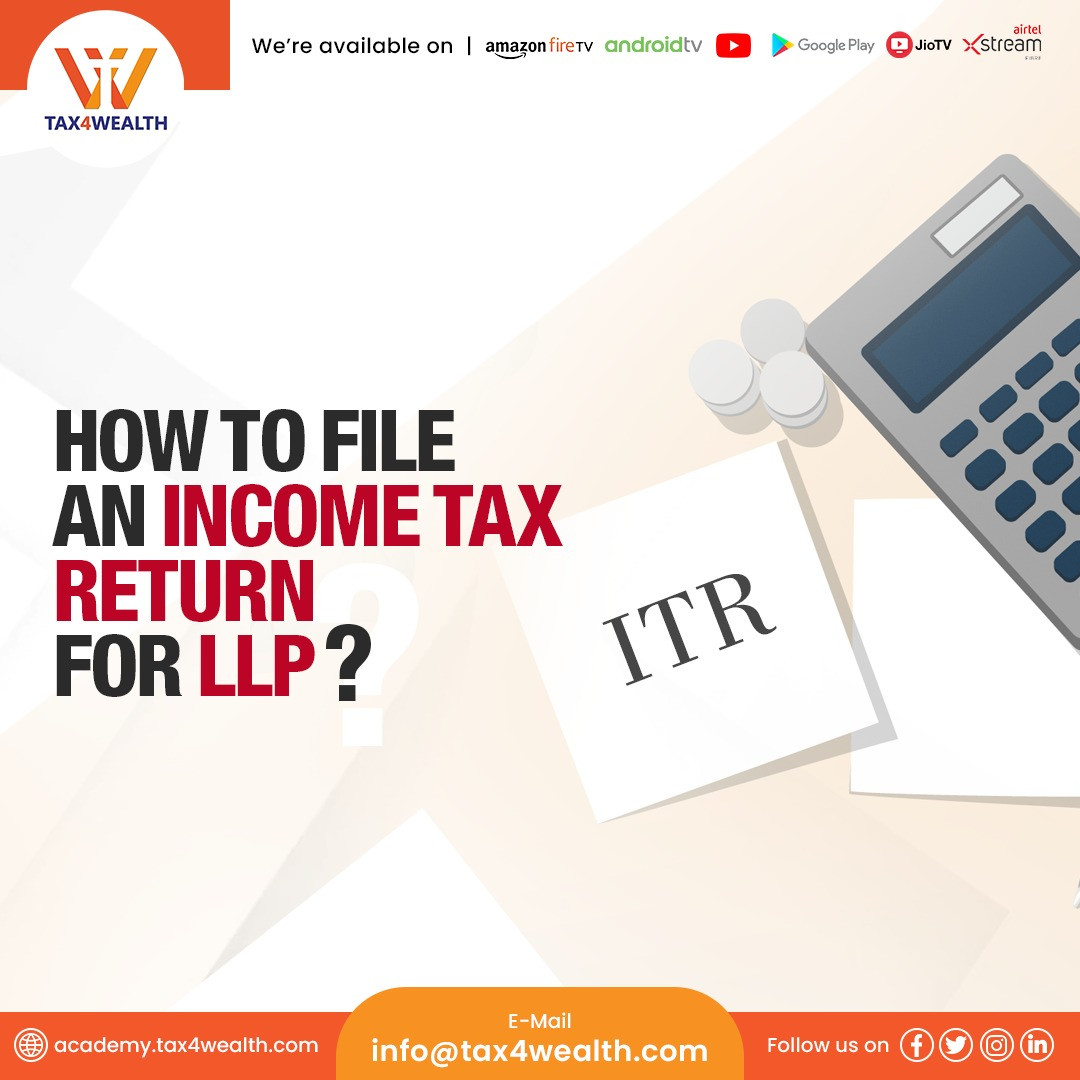
Learn How to File an Income Tax Return for LLP?
According to section 139(1) of the Income Tax Act of 1961, every limited liability partnership formed in India is required to file an income tax return. The yearly income tax return must be filed by the partners of an LLP. You probably have concerns about how to submit your income tax return and yearly LLP compliance because you are an LLP partner. Which form must be submitted? Visit the Academy Tax4Wealth to learn How to Prepare an Income Tax Return for LLP. This blog post will cover every aspect of filing an income tax return for an LLP.
What is an LLP?
A limited liability partnership (LLP) is a corporate entity that was established and formed by the 2008 Limited Liability Partnership(LLP) Act. It is a separate legal entity from the people who are affiliated with it as its partners. An LLP must be accountable for all of its assets, but the partners' responsibility is only as much as the investment they have agreed to make in the LLP. The LLP's organizational form combines elements of both a corporation structure and a partnership company structure since the partners' obligations are restricted to their agreed-upon participation in the LLP. Furthermore, a partner is not personally liable for any fraudulent acts.
How to File an Income Tax Return for an LLP:
Step 1: Account Statement:
You should create the LLP's statement of accounts before starting the tax procedure. The first stage in creating the LLP's financial statements is the creation of the statement of accounts. You need to be careful and follow the 1961 Income Tax Act's rules.
Step 2: The Income Tax calculations:
The calculation of taxable income is the most important phase in the Income Tax Return for LLP filing process. For your LLP, the accuracy of financial accounts is crucial when calculating taxes. The way these costs are handled by the income tax laws differs because, if they don't comply with the law, they are effectively seen to be expenses, raising the amount of taxable income.
Step 3: Disallowance of expenses under the ITR Act:
If the LLP complies with the regulations, the income tax department will additionally recognize a specific payment as a cost to the LLP. Here is a list of typical tax deductions and explanations for LLP's ITR.
- The first costs are only permitted up to 1% of the LLP's capital.
- All payouts are prohibited because some expenditures necessitate not deducting TDS.
- Penalties for late tax payments, such as TDS, GST, etc., are not permitted
- The maximum pay for partners is 90% of the earnings, up to Rs. 3 Lakh, or 60% afterward.
- If partner compensation is mentioned in the LLP agreement, please review it.
Step 4: LLP's Income Tax Payment:
Through the Income Tax Portal, the LLP Income Tax self-assessment can be charged electronically. On the tax payment page, choose Challan Number - 280 and adhere to the on-screen instructions. Almost all banks offer internet banking with the ability to levy an income tax. According to the information on the income tax web, the income tax return for the LLP may also be charged using several banks' debit cards. You can mail a check and a Tax Challan 280 together with your income tax payment when you visit your branch to do so.
Step 5: Creating the profile:
Create a profile on the Income Tax Portal to file the LLP's income tax returns. The LLP is anticipated to submit for the first time on the income tax export site due to the electronic Income Tax Return filing for LLP. The LLP must be registered using both a mobile and email OTP. On the income tax site, one selected partner must be identified as an authorized signature. When the ITR is filed, the designated partner's digital signature is also registered on the ITR website for validation reasons.
Step 6: Filing Income Tax:
The self-assessment tax must first be paid before the income tax return for LLP can be submitted. Any authorized partner's digital signature may be used to submit the LLP ITR. However, the partner's Aadhaar-based OTP, which is recorded on the income tax portal, may also be used to examine the LLP ITR.
The due date for LLP Income Tax Return submission:
- The LLP has been filing ITRs since April 1.
- July 31st is the deadline.
- The deadline for tax audits is September 30.
- ITR-5, the appropriate LLP ITR form.
- Late ITR filing: up to the end of the fiscal year.
How do files form ITR 5 of LLP?
The Income Tax Department accepts offline and online submissions of the LLP's form ITR 5:
Offline ITR 5 filing procedure: Both the paper return and the bar-coded return may be submitted while filing the form offline. When filing a return on paper, an acknowledgment slip is included with the form and must be properly submitted.
Online ITR 5 Filing Procedure : The ITR 5 can be submitted electronically with a digital signature or by electronically providing the data in the return and then filing the income tax return form ITR-5 to verify the return.
Also, Read; Who is eligible to use ITR 5 Form and How?
Advantages of filing Income Tax Return of an LLP:-
The advantages of submitting an income tax return for an LLP are as follows.
1. Obtain a loan quickly:
A partnership organization or corporation can readily obtain loans from several financial institutions by filing an income tax return. Most banks and NBFCs need an ITR receipt from the firm for the previous three years when a business requests high-value loans, such as a business long-term loan or a working capital loan. Lenders see the ITR as the most accurate record of the company's revenue and turnover. Therefore, LLPs should file their income tax returns on time if they intend to request a loan in the future.
2. Carry forward the losses:
By correctly submitting income tax returns and adhering to LLP yearly compliance, the firm may carry forward losses from the income of the prior year. Most businesses experience losses in the first few years of existence. The business loss or capital losses may be carried forward for a total of eight years if the ITR is lodged. However, the taxpayer forfeits this advantage if an ITR is not lodged.
3. Net worth:
The financial situation of the business is described in the ITR filed with the government. Tracking the net value of the company by presenting business turnover, assets, and revenue is made easier by filing income tax return compliance for LLP. The ITR filing record demonstrates the individual's financial capability and increases their capital base.
Due Date for ITR-5 Filing:
The deadline for submitting ITR5 is July 31st for the firm whose finances are not subject to audit. By October 30th, the business whose financial records are subject to audit must submit ITR5 compliance for LLP.
Click here 👉 How to File an Income Tax Return( ITR).
FAQs on Filing LLP Income Tax Returns Online in 2023:-
1. Is it possible to file a return after the deadline?
Yes, a late return may be submitted before the appraisal year's end or before its conclusion, whichever comes first. For income made during FY 2016–17, the late return may be filed up until 31 March 2018.
2. Is filing income tax returns required?
Yes, whether there is a profit or loss, every LLP firm is required to file an income report.
3. Can I file a revised return to fix an error in the first return that was filed?
Yes, if the update is made before the assessment is finished or within a year of the conclusion of the current assessment year, whichever comes first. The plan excludes filing amended returns. To avoid the need for any corrections to the initially submitted return, the intending buyer is required to provide, complete, and accurate information.
4. Should I save a copy of the filed return as documentation? In such a case, how long?
According to the Income-Tax Act, legal action may be taken up to 4 to 6 years (depending fully on a case-by-case framework) before the current fiscal year. It is best to save the return copy for at least 6 years or as long as possible since in some circumstances hearings cannot be started until after 6 years have passed.
5. Can I include details on TDS deductions, investment documentation, etc.?
The ITR cannot be accompanied by any other documentation, such as proof of investments or TDS certificates. However, such data should be kept and presented to the tax authorities, when necessary, in situations like review, inquiry, etc.
For more update, Visit us at: https://academy.tax4wealth.com/blog
No comments yet, Be the first to comment.













